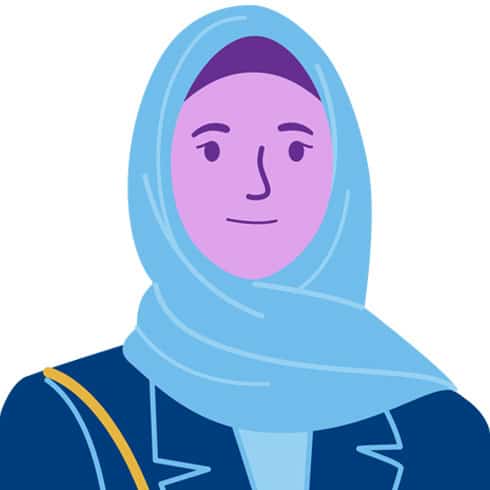
Patient Story
Salma’s Story
My name is Salma*, I am 32-years-old and I have Crohn’s Disease. I work as a banker in Dubai and I have lived in the UAE most of my life.
Before a diagnosis
Before I became ill, I was a happy-go-lucky kind of person. I always loved going out and spending time with my family and friends. Then I started to become unwell. I noticed green coloured diarrhoea and I was constantly vomiting. This was accompanied by severe cramps and dehydration.
Diagnosis
I was first diagnosed with IBD in 2015 when I was 26 years old. I was told that I had Crohn’s disease, but then in 2018, I was informed that it was actually ulcerative colitis. I then had surgery but since then, have been told that I might actually have had Crohn’s disease all along! It is a confusing condition to live with, and even the doctors have struggled to give me an accurate answer. I can’t help but feel that if I had received an accurate diagnosis in the first place, I wouldn’t have had to suffer for so long. At first, everyday life was still hard – I would get so anxious at the thought of being stuck with no access to a nearby restroom. In fact, even simple things, like standing in a long line at the supermarket, would make me nervous.
A life changing moment
Stigma
I am naturally a very patient, level-headed person and a firm believer in destiny. After I received my diagnosis, it took me around a year to fully accept it. It was only after I had experienced the challenges that a severe flare up brings that I could fully understand what living with IBD really meant.
I then felt ready to accept this challenge, and at that moment, a part of me decided to adopt a ‘come what may’ attitude.
Advice for my younger self
There is a huge amount of stigma attached to IBD. It really isn’t easy to talk about things like stools and diarrhoea and vomiting; people just don’t want to hear you talking about it, which can make you feel very alone. We need to increase awareness of IBD in the UAE to help break down the stigma; it would help people accept that the condition exists and that we should be able to talk about it freely.
Treatment
Over the years I have tried all the treatments available, from steroids to biologics. Initially medication was able to control my symptoms, but at times I would have flare ups so severe that none of the medications would work. In the early days, the steroids would work like a miracle drug for me and reduce the immediate pain, but I was in for a rude shock when I suffered the side effects. I got so fed up at having to constantly answer questions from my colleagues or people around me, who wanted to know why I had suddenly gained so much weight and why my face was so swollen. Very quickly I lost a lot of my self-confidence and I started to avoid going out. I couldn’t even look at myself in the mirror.
Life after surgery
My support network
Maintaining a positive outlook on life and being able to talk openly about IBD have been the two things that have helped me the most. I try and surround myself with people who are supportive and empathetic. I am very lucky as I have countless guardian angels, without whom my journey would have been incomplete. I have my family and friends, the IBD support group, doctors and medical teams; every one of them has played a major part in helping me get to where I am today.
I started to look for a support group based in the UAE so that I could feel more connected to others in the same situation as me. One day, my sister stumbled upon a WhatsApp support group, the Crohn’s & Colitis Fighters, which had just 20 members two years ago. Today, we have built a support group with more than 70 members, including doctors and healthcare professionals. It is essential for patients to talk and meet with each other as only they can truly understand each other’s struggles.
The future
It has been a difficult and challenging journey. But since finding the right support group, who have helped guide me through it, I am now in a happy place.
*name has been changed.
